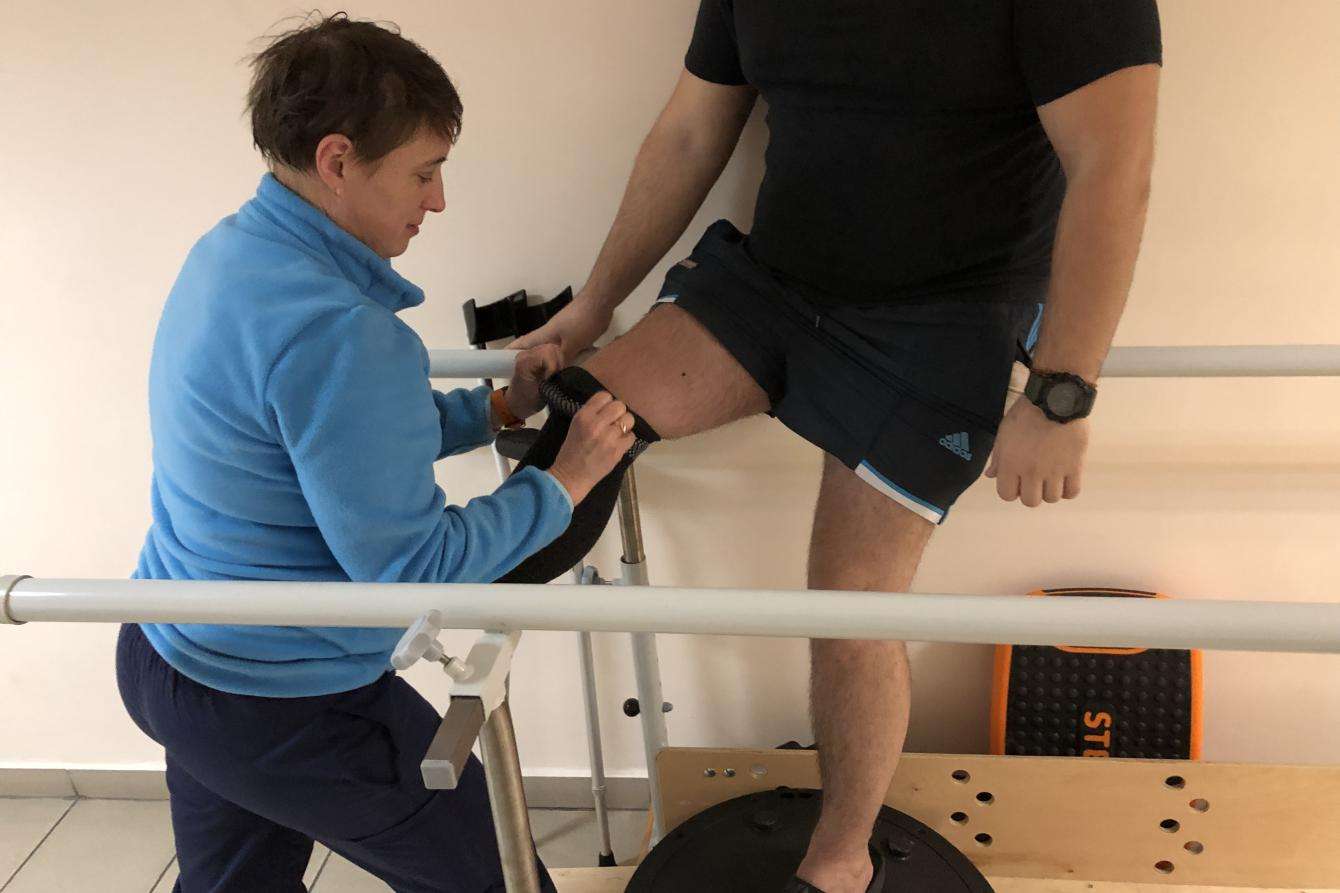This evening, I'm taking my dog for a slightly longer walk than usual. It's been an emotionally challenging day at work. Stalker—that's my dog's name—always senses when I feel overwhelmed and need a release. I often confide in him about the strength of spirit and character I witness in my patients.
As a physical therapist at MSF, I work with a team that runs a comprehensive rehabilitation initiative at a hospital in Kyiv. This project integrates both physical and mental components, aiming to uplift people grappling with severe injuries from the war.

MSF brought to Ukraine experienced specialists who had worked during international armed conflicts and wars in various countries and treated patients with the types of injuries we are now seeing. Although the war in Ukraine has been ongoing since 2014, the demand for treatment for war-wounded individuals has not been comparable to the current situation. These doctors provided me with valuable instruction and guidance on carrying out rehabilitation exercises for patients with injuries and amputations.
Initially, it was challenging to come to terms with what I was seeing: patients with injuries reminiscent of those during World War II. These patients arrive in the hospitals by the dozens. I vividly remember one night at the beginning of the full-scale escalation of the war, when an entire train carrying people with serious lacerations, bullet wounds, and amputations arrived in Kyiv from the front line. Some of them ended up in the hospital where we are running the rehabilitation project.
Sometimes, patients who arrive at the hospital are depressed. They do not wish to see anyone and are not in the mood for rehabilitation; they just lie in their hospital bed. Often it requires a great deal of endurance to convince them that there is always hope. I explain to them the importance of early rehabilitation as we commence physiotherapy so they can learn how to adapt to a normal life with a new body.

Andrii's story
Over the past six months, I’ve worked with more than 50 patients, each with a unique story and their own journey to recovery. Today, I met with Andrii, a 27-year-old man preparing for prosthetics after sustaining injuries during fighting on the front lines last April. Unfortunately, he lost his right arm, leg, and nearly all of his vision.
Andrii and I are navigating a challenging journey together. Prior to fighting in the war, he worked as an IT specialist. After he was injured, he was hesitant to leave his bed and had difficulty imagining a future for himself. With the support of a psychologist and active involvement from his mother, we began our rehabilitation efforts.
I encouraged Andrii to stand on his remaining leg and take small steps with a rolling walker, incorporating breathing exercises as he goes. Gradually, we progressed to the physical therapy room. We started exercises with him in a wheelchair. Our focus includes stretching muscles in the abdomen, trunk, and limbs, along with specialized exercises to prevent joint mobility restrictions that could hinder his ability to use prosthetics.
The preparation of the stump for a prothesis can be accompanied by acute pain. Despite the still-fresh stitches after surgery or amputation, if we don't work with the joints in time, they will narrow and it can be impossible to put on a prosthesis—the stump will not hold. I witness how Andrii and other patients overcome this pain, and I find it admirable.

Physiotherapy and mental health support for Ukraine’s war-wounded
Read moreFinding hope to move forward
During moments when Andrii feels emotionally burnt out, I suggest simple tasks like "doing a swallow"—balancing on one leg and imagining flying. I conclude our sessions with humor and words of support to lift Andrii’s spirits.
To distract ourselves, we often delve into discussions about football and the achievements of the Ukrainian national team. I used to play professional football and I share stories of injuries I endured during my career and how I overcame them. I tell Andrii and other patients that personal belief in victory—over pain, difficulties, and challenging conditions—is crucial.
At times, emotions overwhelm me, and when I come home, I sometimes cry alone with my dog. I reassure him, saying, "Don't worry, Stalker, I'm fine." I want my patients not to lose faith in themselves and to find happiness in their new lives, to learn to walk again, drive a car, play football, hold a child in their arms, or run with a dog in the park.
After our session, Andrii went to the prosthesis center. He sent me a video of himself being measured for a new leg and arm, saying, "Now I can't be stopped!" We both felt happy at that moment.
I often feel what I call "satisfying weariness" after a day of work. It's that need for an emotional recharge, but my heart is happy for the success of the patients. I energize quickly, especially when Stalker is around. As we stroll down another alley, I breathe in the fresh air, then head towards home, ready for a restful night. Tomorrow, I will be ready to kick off a new day with my patients.
About Inna
Inna Didych is a physical therapist with MSF. Before the full-scale invasion of Ukraine, she worked as a physical therapist in the Kyiv Regional Hospital's rehabilitation department, caring for patients who experienced COVID-19, brain injuries, strokes, and heart attacks. She holds the title of Master of Sports of Ukraine in football, is a professional trainer, and a FIFA referee.




